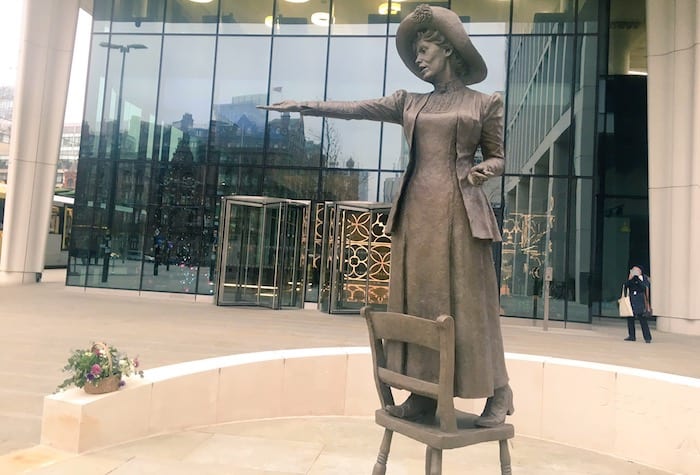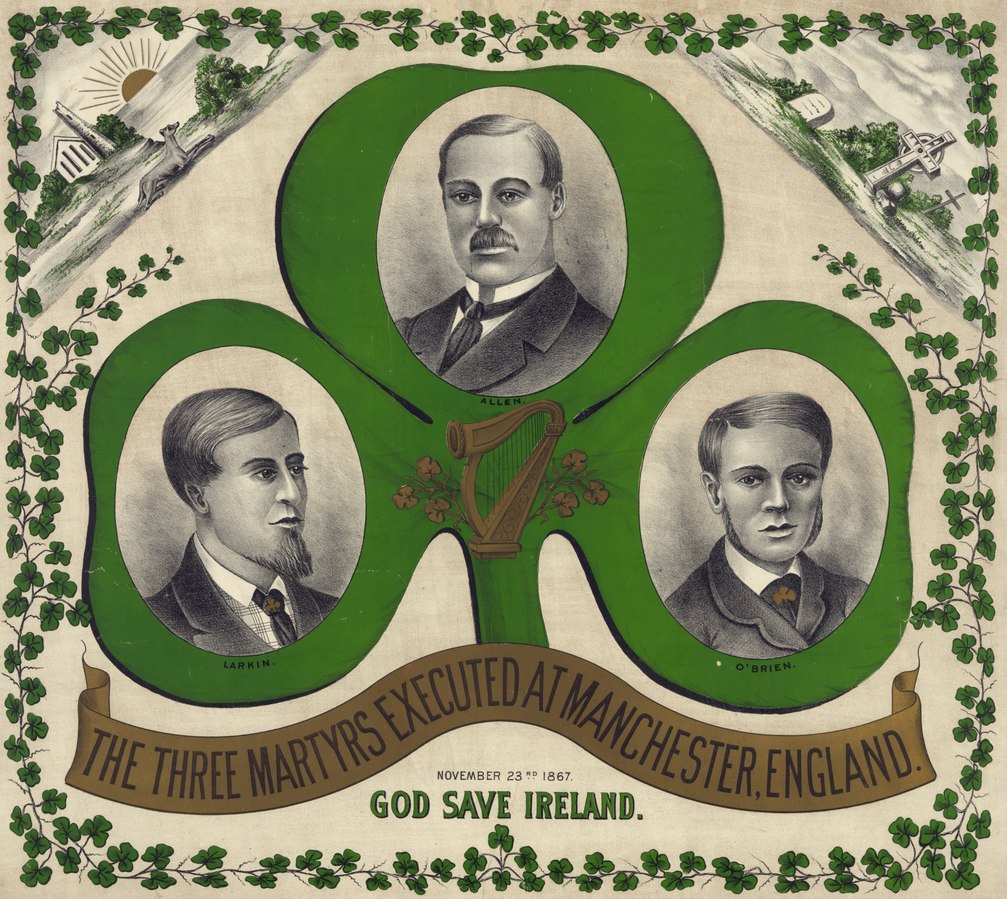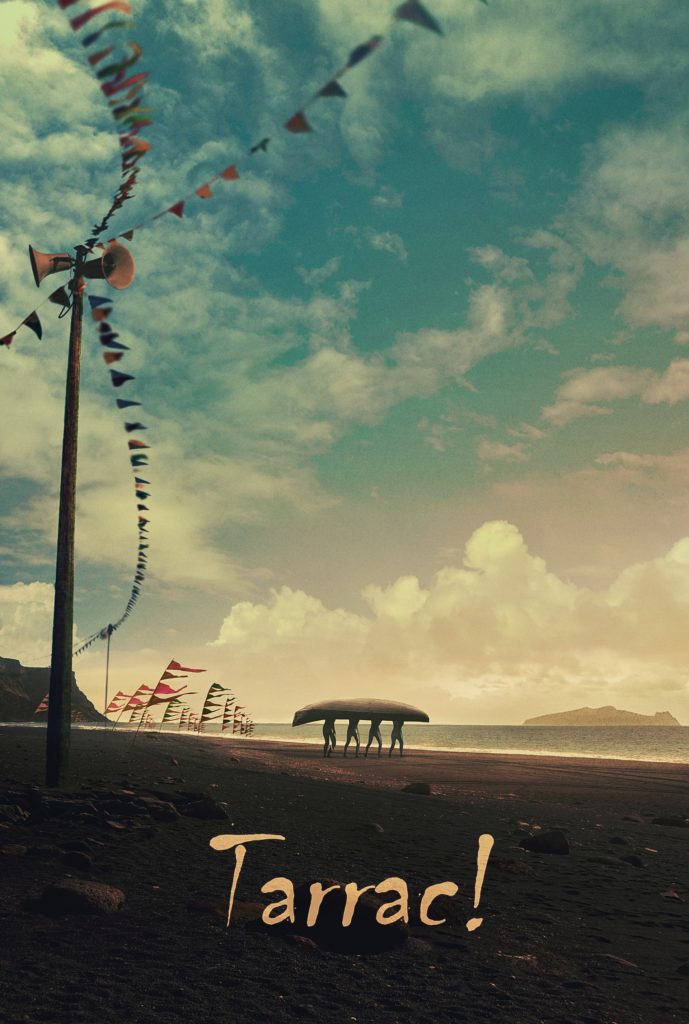Manchester Irish Language Group Arts Festival begins next week on Friday, September 29. The festival features music, online Irish language literary events, Irish film events and a historic, bilingual walk through Manchester
Mark Gourlay picks out the highlights
 GAEILGE GIG Róisín Seoighe (image by Cathal Mac an Bheatha)
GAEILGE GIG Róisín Seoighe (image by Cathal Mac an Bheatha)Friday, September 29
Pop-up gig - Róisín Seoighe X IMLÉ followed by a Pop-up Gaeltacht.
The gig will be in Eccles, Salford – at a secret location to be announced to ticket holders 24 hours before the event.
Begins 8pm
Tickets are £10 each and can be purchased online at Eventbrite by searching for ‘Manchester Irish Language Group’.
Saturday, October 7
 Emily Pankhurst statue
Emily Pankhurst statueBilingual History Walk
Starting at Engels statue, Tony Wilson Place at 10.30am
Tickets are free but must be booked online at Eventbrite by searching for ‘Manchester Irish Language Group’.
Saturday, October 14
Irish Film Morning - Tarrac (Cert. 15) followed by bilingual discussion with Dr. Sorcha Ní Fhlainn
Home Arts Centre
Thursday, October 19 at 7pm
Online Literary Event - Éilis Ní Dhuibhne
Those wishing to attend should email: [email protected] for Zoom details.
Irish Language Writing Competition
Entries now open. Closing date for submissions is October 5. All details can be found at: comortasscribhneoireachta.wordpress.com
The events in detail
Concert and Gaeltacht
Pop-up Gig - Róisín Seoighe X IMLÉ
The musical collective IMLÉ was founded by producer and musician Cian Mac Cárthaigh in 2016. The goal is to combine different musical styles with various musicians and singers, similar to acts such as Gorillaz and Massive Attack. The main difference is that IMLÉ sing and rap in Irish – producing a sound and style that has never been heard before in the Irish language.
IMLÉ’s second album, Fáilte Isteach, is available now on Gael Linn Records and sees Mac Cárthaigh working with an eclectic group of musicians which includes Róisín Seoighe, MC Muipéad, Ríona Sally Hartman, Fergal Moloney and Dave Hingerty, with production from Karl Odlum and Darragh Nolan as well remixes by Ross Whyte and Odlum. Fáilte Isteach sees a shift in sound from the group to more Hip-Hop, R&B and electronic sounds.
Róisín Seoighe is a musician and singer from Connemara in Galway. Her music mixes different genres from pop and folk to traditional music. Róisín began her musical life as a seán nós Singer and you can still hear traces of that in her work.
Róisín mixes different styles into a unique blend in the Irish language. Her music and lyrics cover many different topics from language rights, our relationship with the world around us and finding hope in despair.
2023 has been a busy year for IMLÉ and Róisín Seoighe.
They have been writing and recording an EP together but as well as that have found time to clock up more live performances in Ireland and abroad.
The concert is followed by Pop-up Gaeltacht
The event is bilingual, but guests with some Irish will be able to join a pop up Gaeltacht in the kitchen to try out their Gaeilge. And everyone knows the kitchen is the place to be at parties.
The walk
 The Manchester Martyrs (image from the Library of Congress - now in public domain)
The Manchester Martyrs (image from the Library of Congress - now in public domain)A walk through the Irish streets of Manchester
A walk and talk in Irish and English will unravel the Irish influence in Manchester, from the Chartist movement through to Marxism, and many stops in between
The bilingual Irish/English history walk will take place in Manchester city centre on Saturday, October 7, beginning 10.30am
The theme of the odyssey is Irish Manchester’s important role in radical politics in England, and how it is often overlooked.
This may be particularly true as the Irish become, to some extent, more subsumed into broader British society.
The walk will start at the Engels statue on Tony Wilson Place at 10:30am and will then visit some of the locations of Irish interest around the city centre.
The walk is being conducted by Tom Togher, one of the Manchester Irish Language Group tutors.
This is the second such walk, the first taking place in 2019 to coincide with the bicentennial commemoration of the Peterloo Massacre. The Peterloo Massacre took place at St Peter's Field, Manchester in 1819. Fifteen people died when cavalry charged into a crowd of around 60,000 people, gathered to demand the reform of parliamentary representation.
This commemorative event 200 years later in 2019 took place just before lockdown. The commemoration was so well received that it was planned to make it an annual event, but then Covid intervened.
This September’s walk will visit the site of Little Ireland — the original slum area, once home to most of Manchester’s Irish. This is where Friedrich Engels wrote his study of the conditions of the English working class, and on which he based his research — which would later form, along with the work of his lifelong friend Karl Marx, the basis of Marxism.
In Manchester, Engels met Mary Burns, a young Irish woman with radical opinions. They began a relationship that lasted 20 years until her death in 1863. Burns guided Engels through Manchester and Salford, showing him the worst districts for his research. After Mary’s death her sister Lizzie eventually became Engels’ partner.
The walk also takes in the new Pankhurst monument, where there will be a discussion on the connections between radical politics in pre-Easter rising Ireland and the campaign for votes for women.
The establishment of the first approved places of worship will also be visited, as well as a stop in Lincoln Square to look at the role of Irish labour in the American Civil War cotton embargo. Lincoln’s letter of thanks to the workers of Manchester will be remembered.
The walk passes by the John Ryland’s Library — where there’s an important collection of medieval Irish language books. This is a beautiful collection, but if you want to do some serious reading you’ll need a smattering of Latin as well as Irish.
Then on to the site of the execution of the Manchester Martyrs. The poem about the hanging, God Save Ireland by T.D. Sullivan, was published in 1867 in The Nation newspaper. Set to the American tune Tramp, Tramp, Tramp The Boys Are Marching, it served as an unofficial Irish national anthem for nationalists from the 1870s until the 1910s, after which The Soldier’s Song was adopted.
God Save Ireland is in honour of the three Manchester Martyrs — Michael Larkin, William Phillip Allen, and Michael O'Brien. They were executed for mounting an attack on a British police van transporting two Fenian prisoners John Kelly and his colleague Timothy Deasy to Belle Vue Gaol in Manchester. In the ensuing struggle a British policeman was killed. The execution was one of the last public hangings in Britain, and aroused bitter public feeling in Ireland.
John McCormack the tenor, then residing in the USA, had a big hit with God Save Ireland. He accordingly found himself unwelcome in Britain for several years.
It is often cited that the derogatory term “Micks” for Irish people date back to the hanging of Michael O’Brien and Michael Larkin, and “Tims” from Timothy Deary. But no direct written evidence of this exists.
This will all be covered in the walk, then it’s back via the Free Trade Hall for a quick catch up on the Irish involvement with the Chartists, most notably Feargus O’Connor, the Cork man and leader of the movement.
James Connolly’s time in Salford organising the dockers on the Manchester docks and the ship canal is also discussed, and the walk finishes at the Peterloo memorial.
The walk is conducted in both Irish and English. And there’s a chance afterwards to practise your Irish, or find out more about classes.
 Tarrac
TarracFilm morning
Irish Film Morning - Tarrac (Cert. 15)
This is Manchester Irish Group’s annual celebration of Irish language filmmaking. This year’s film is Tarrac about a grieving woman and a women’s rowing crew. The contemporary drama is set on the coastlines of Kerry in the tough world of Naomhóg racing
The director is Declan Recks, and the film is in Irish with English subtitles. It features Kelly Gough, Kate Nic Chonaonaigh and Lorcan Cranitch.
The plot revolves round Aoife Ni Bhraoin (Kelly Gough) and her return home to help her father Brendan ‘The Bear’ Ó Braoin (Lorcan Cranitch) recover from a heart attack. They are distant, however day to day they get along just fine. But as the film develops it becomes apparent that there is so much that has been left unsaid. Aoife has never grieved properly for her mother who died when she was only sixteen. Over this summer she gets pulled back into the competitive world of rowing in naomhóg boats traditional to the area. She lets herself become close to the three women in her crew but as the big race approaches Aoife feels an unbearable strain, years of suppressed grief and sadness that could seriously wreck chances of success.
Tarrac has warmth and a sense of place. This intimate character study of a woman who through a sporting passion finally manages acceptance and love makes for gripping viewing. Laced with humour, heartbreak and exciting action set against the stunning landscapes and seas of the Kerry Gaelteacht, Tarrac is about daring to care again and learning the power of forgiveness
The screening will be followed by a discussion in both Irish and English led by Tom Togher (MILG) and Dr. Sorcha Ní Fhlainn (MMU),
This event is open to all, whether an Irish speaker or not, and is supported by the Irish government.

